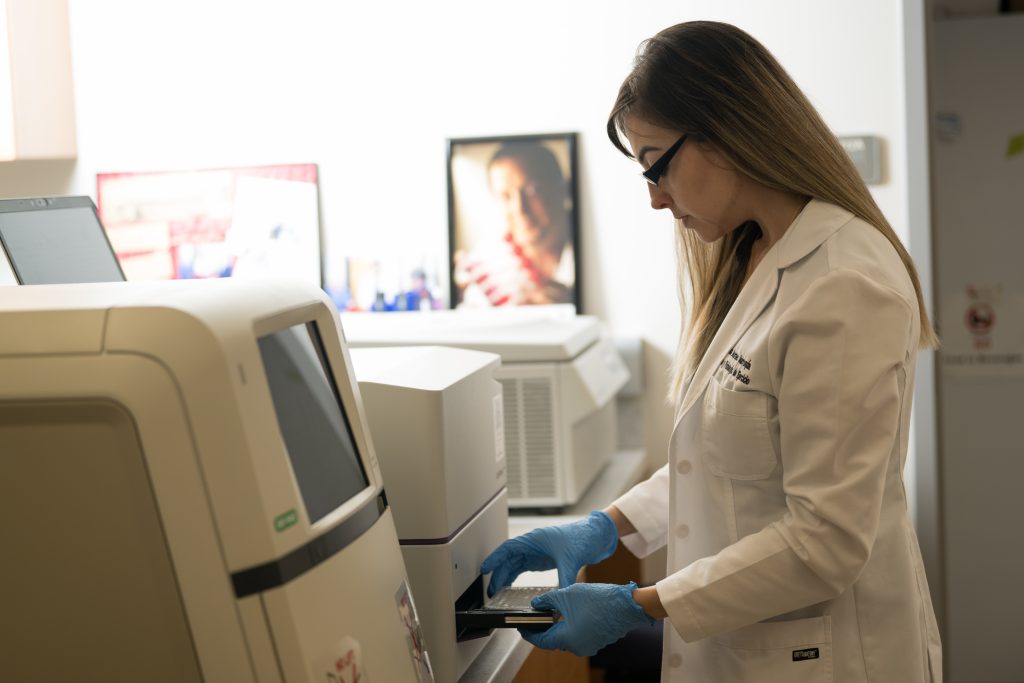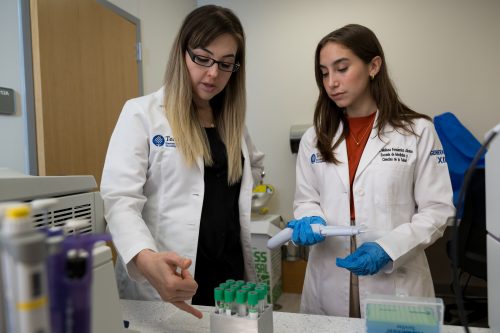Probing Into Probiotics
Elisa Marroquín says they help restore gut health after antibiotics.

“More than half of the evidence shows with certainty that adding probiotics seems to preserve diversity of the gut microbiome,” Elisa Marroquín said.
Probing Into Probiotics
Elisa Marroquín says they help restore gut health after antibiotics.
THE HUMAN MICROBIOTA, ALSO KNOWN AS THE MICROBIOME, consists of trillions of microorganisms hosted within a body. This internal ecosystem plays a critical role in our day-to-day biological functioning.
In the digestive system alone, millions of bacterial colonies line the stomach and intestinal tract. Those tiny organisms aid in breaking food down into useful components, synthesizing vitamins and amino acids, filtering dangerous toxins and boosting the immune system.
Elisa Marroquín, assistant professor of nutritional sciences, is researching the impact of the gut microbiota on the human body. Her study, which gained attention in news outlets including NBC and CNBC, analyzed the role of probiotics in keeping the microbiota operating in optimal harmony.
A host of harmful organisms can infiltrate the microbiota. An out-of-whack system can result in gastrointestinal distress, malnutrition and a weakened immune system. If left untreated, this imbalance can lead to more severe complications, including allergic disorders, ulcerative colitis and diabetes.
Commonly prescribed antibiotics can kill most kinds of harmful microorganisms that enter the body. More than 200 million antibiotic prescriptions are filled every year in the United States, saving an estimated 200,000-plus lives annually, reports the U.S. Centers for Disease Control and Prevention.
Antibiotics, however, are incapable of distinguishing between good and bad bacteria.
“If I have an infection and take an antibiotic, that antibiotic will not only attack the infection, it will also attack all the bacteria in my body, both the good and the bad,” said Melissa Fernandez Alonso, a TCU master’s student and research assistant for Marroquín.
This indiscriminate purge of the microbiota can throw it off balance, interfere with its functioning and lead to many of the same complications the antibiotics were intended to counteract, including new infections that might be even more dangerous than the first.

Elisa Marroquín’s recent research focuses on the effect of antibiotics and probiotics on the human microbiota.
Marroquín is studying the ways in which probiotics can be used to offset the side effects of antibiotics and help repair the body’s microbiota.
Probiotics stimulate the growth of beneficial bacteria. Some nutritionists believe probiotics can be used to rebalance the human microbiota and speed up the process of recovery after prolonged use of antibiotics.
Some critics, however, contend that using probiotics alongside antibiotics could permanently alter the microbial makeup.
“Some of the concerns in the nutritional community are that, since antibiotics already alter the composition of the gut microbiota, taking a probiotic, which is essentially its own strain of bacteria, along with antibiotics could unpredictably alter the base microbial composition of a person,” Alonso said.
Scientists know that every person has a unique base microbial composition in the same way that each person has a one-of-a-kind fingerprint. They are less certain about how altering that microbial fingerprint might affect a person’s health. As such, some nutritionists are hesitant to promote a treatment that could modify the microbiota.
Marroquín’s study, published in the November 2022 Journal of Medical Microbiology, is a systematic review of existing human-based clinical studies. Her study focused on trials that evaluated the use of antibiotics alone, probiotics alone, and antibiotics and probiotics used in tandem, and the effects of these treatments on the human microbiota.
Marroquín compiled the results of 29 peer-reviewed experiments exploring a variety of antibiotics and probiotics, as well as combinations of the two.
“What we failed to see during our systematic review,” she said, “was any clinical research to back up the claim that using probiotics alongside antibiotics could change a human’s microbial signature.”
As promising as these results are, Marroquín said she believes that more research should be conducted to understand the effects of antibiotics and probiotics and the impact on the human microbiota. “The majority of studies that have been published so far have been focused on the short term. I would like to see long-term human studies.”
Marroquín’s review has drawn interest in the nutritional science community as well as mainstream media. Her work has been referenced in at least 39 national news outlets.
“I am happy to say our study had a big impact in the nutritional science community,” Alonso said. “I believe it showed everyone more conclusively what our current research says about this treatment.”

TCU assistant professor Elisa Marroquín and research assistant Melissa Fernández Alonso learned that “if I have an infection and take an antibiotic, that antibiotic will not only attack the infection, it will also attack all the bacteria in my body, both the good and the bad,” Alonso said.
For now, Marroquín supports the use of probiotics with antibiotics, as existing studies do suggest the combination is medically beneficial.
“More than half of the evidence shows with certainty that adding probiotics seems to preserve diversity of the gut microbiome,” she said. “And having a diverse gut microbiome has been linked to prevention of infections and decreased likelihood to develop chronic conditions and autoimmune diseases such as asthma, obesity and Type 2 diabetes.”

Your comments are welcome
Comments
Related reading:
Immersed in Exercise
Kinesiologist Robyn Trocchio turns to virtual reality to help people have fun getting fit.
Research + Discovery
Deeper Compassion
Joe Hoyle’s capstone project examines the impact of empathy training on scuba volunteers.
Research + Discovery
Rattling the Supply Chain
Tyson Browning studies the unintended consequences of punitive economic actions.